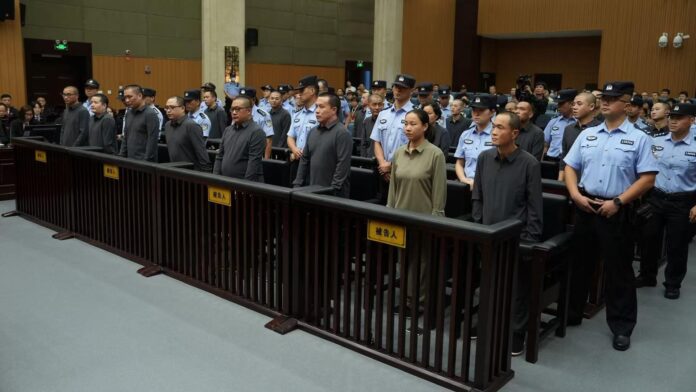A court in eastern China has sentenced 11 people to death for their roles in a powerful family-run crime syndicate accused of running illegal online scams and gambling operations worth more than $1.4 billion, as well as killing workers who tried to escape.
The Wenzhou Intermediate People’s Court said on Monday that Ming Guoping, Ming Zhenzhen, and Zhou Weichang all members of a notorious family based in Kokkang, Myanmar—were sentenced to death alongside eight others. Five additional defendants received suspended death sentences, which are often commuted to life imprisonment, while 12 others were handed prison terms ranging from five to 24 years.
Chinese authorities issued arrest warrants for members of the Ming family in November 2023 on charges including fraud, murder, and illegal detention, as part of a sweeping crackdown on cross-border scam operations near Myanmar.
The court said the syndicate’s crimes led to the deaths of 10 workers and injuries to two others who attempted to flee the scam compounds it controlled. In total, the group was found responsible for killing 14 people, including those involved in fraud who defied orders.
One October 2023 incident was cited in which the accused “opened fire” at a compound to stop individuals from being repatriated to China.
From 2015, the organization engaged in cyber fraud, drug trafficking, organizing prostitution, and operating illegal casinos. Authorities said these activities earned the group more than 10 billion yuan (about $1.4 billion).
Scam compounds have flourished in parts of Southeast Asia, particularly in Myanmar’s border regions, where trafficked workers—many of them Chinese nationals—are forced to run sophisticated online scams, including romance-based investment frauds. The United Nations Office on Drugs and Crime estimates the industry to be worth around $40 billion annually.
In recent months, China has intensified cooperation with neighboring countries to crack down on such operations. Joint efforts by China, Myanmar, and Thailand earlier this year led to the release of more than 7,000 workers from scam centers along the Thai-Myanmar border. Thousands have since been repatriated to China.
Five of the convicted received death sentences with a two-year reprieve, while another 23 defendants were sentenced to prison terms ranging from five years to life, the court said.

